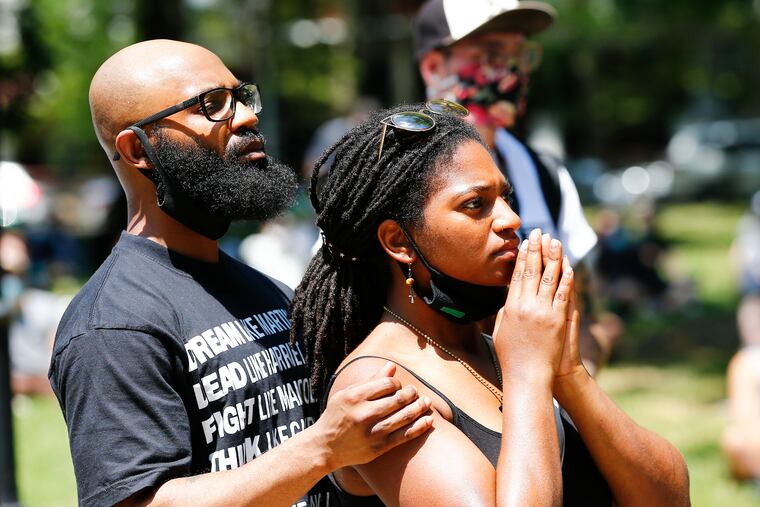Protesters call for release of Black inmates, saying they were unjustly imprisoned under Rizzo
“I feel like the knee on the neck to people in our community at that time was the legal system,” said a member of the Human Rights Coalition.

In a passionate but peaceful rally in West Philadelphia’s Malcolm X Park on Sunday, activists called for the release of Black prisoners who they said have been unjustly incarcerated since the days of Frank Rizzo, the former mayor and police commissioner known for his aggressive policing tactics in the city’s African American communities.
The multiracial crowd, which numbered close to 400 people, and included members of several grassroots activist groups, also applauded calls for defunding police and for police reform.
“Today, we’re out here to keep their names and their sacrifice out here,” said Robert Holbrook, a member of the Black Philly Radical Collective, a group that considers many of the remaining Rizzo-era convicts as “political prisoners.”
“The only way to deal with a bully is to stand up and fight back,” said Mike Africa, who said he was born in prison 41 years ago. His relatives were part of the MOVE organization who lived together in homes that the city had infamously firebombed. Several family members were later incarcerated.
“The system will not change until it’s forced to make a change,” Africa said.
Yvonne Platts, a member of Free People Strike, another activist group, called on the throng to pressure their elected officials to release prisoners 65 and older who have been identified as vulnerable to the coronavirus. She said the correctional system has been slow to act.
“We need the Philadelphia community to stand strong,” Platts said.
The speakers included relatives of some of the people seeking release, like Fred Burton Jr., son of Fred Muhammed Burton, whose supporters say he has been wrongly imprisoned for the death of a police officer since the 1970s.
Along the outskirts of the rally, there were tables of literature, advocacy organizations, and individual appeals for justice from people like Karen Ali, who said her husband, Omar Askia Ali, has been fighting a wrongful murder conviction for close to 50 years.
While the recent removal of the Rizzo statue was a symbolic victory, Ali said real justice will be when people long unjustly incarcerated are freed.
“I feel like the knee on the neck to people in our community at that time was the legal system,” said Ali, a member of the Human Rights Coalition and other groups.
On the grassy field of the park, a diverse crowd gathered to listen, some with Black Lives Matter and Free Mumia placards and other signs of support.
Many of the listeners were white, like Miriam Oppenheimer, a professor and member of RefuseFascism.org.
Oppenheimer said that when police abuse their power “it affects everyone in Philadelphia. We all have to live in fear.”
Lucy Knudsen, a college student from Delaware accompanied by her mother, Stephanie Sullivan, a teacher, said she came to learn more and raise the numbers of those represented at the rally. Both women are white.
“These past few months have been a call to act for white people and Black people and for the government to be held to a higher standard,” said Knudsen.